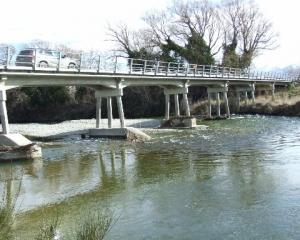The Otago Regional Council's reversal of a panel recommendation not to invest in a Tarras irrigation scheme makes a ''mockery'' of the public consultation process, some submitters say.
However, council chairman Stephen Woodhead denies this, saying public submissions were not ''a vote'' or directive.
A recommendation by a council hearing panel not to give the council the option of investing in the Tarras Water Ltd's scheme was overturned by the full council this week.
The hearing panel had considered 68 submissions, of which 80% were against the scheme, before coming to its decision to recommend the council take the funding request from Tarras Water Ltd no further.
Cr Sam Neill said at the meeting this week the panel had taken on board submitters' concerns about the investment not being council core business, conflict of interest and it benefiting private individuals before coming to its decision.
''The submitters were very balanced and fair.
''Most submitters considered it [the scheme] should go ahead but ...''
Of the four members of the hearing panel at the meeting, Cr Neill was the only one to back its recommendation during the council vote.
Otago Federated Farmers, which supports the Tarras scheme, submitted against the investment proposal, stating its belief it was not the council's core business. Chairman Stephen Kortegweg said when contacted they were disappointed as the turnaround appeared to have made a ''mockery'' of the hearing process.
It appeared submitters who were mostly against the investment had been ''somewhat ignored'' by the full council.
''It makes you wonder why you go to a hearing.''
Central Otago Environmental Society spokesman Graye Shattky said while he had yet to consult society members, he was surprised the panel's recommendation was overturned.
''The ORC appears to have turned its back on important principles of governance.''
Fish and Game Otago chief executive Niall Watson said it was ''really alarming'' the decision had been overturned because the full council had not heard all the evidence presented to the hearing panel. It also appeared the decision prejudged the minimum flow discussions for the Lindis River.
Mr Woodhead said the council decision to reverse a hearing panel recommendation was ''unusual'' but not unheard of.
''Ultimately, it is the full council's decision to accept or overturn a recommendation.''
Public submissions were always taken into account when a decision was made but they were not the only information considered, he said.
The hearing panel had considered purely the investment proposal and submissions it had been tasked with, but in making its decision this week the council had considered other aspects such as the environmental, social and economic benefits of the scheme.
''There's a much bigger picture and wider issues councillors grapple with.''
Cr Doug Brown, a member of the hearing panel was not present at the meeting.


